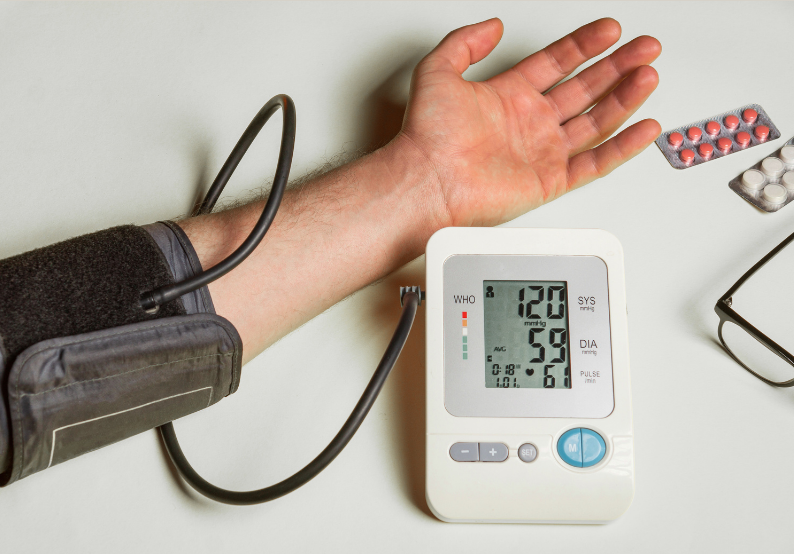Understanding Blood Pressure

Understanding Blood Pressure: What You Need to Know About Hypertension
Hypertension, or high blood pressure, remains one of the most common yet silent contributors to heart disease and stroke worldwide. Many people may not know they have it until complications arise — which is why understanding your numbers, your risks, and how to manage them is essential.
What Counts as High Blood Pressure?
Hypertension is defined as a blood pressure (BP) reading of 140/90 mmHg or higher, typically measured on at least two separate occasions (Ona et al., 2020; Mann, 2023).
Here is the general classification:
| Classification | Measurements |
| Normal Blood Pressure | < 120/80 mmHg |
| Borderline / Prehypertension | 120–139 / 80–89 mmHg |
| Hypertension | > 140/90 mmHg |
If left untreated, hypertension can lead to serious complications such as heart disease, stroke, and kidney problems, making timely management critical (Ona et al., 2020).

(source: https://www.tmh.org/blogs/five...)
Risk Factors for Hypertension
Certain factors increase a person’s likelihood of developing high blood pressure (Mann, 2023). These include:
- Advanced age
- Obesity
- Family history of hypertension
- Being from a Black ethnic group
- High dietary sodium intake
- Excessive alcohol consumption
- Sedentary lifestyle with minimal physical activity
Understanding these risk factors can help individuals make informed lifestyle choices and seek early screening when necessary.
Screening for Hypertension
Routine monitoring plays an important role in early detection. Adults aged 40 and above without a history of hypertension should have their BP checked annually. Those with risk factors, such as obesity, family history, or previously elevated readings, should be screened more frequently.
To confirm a diagnosis of hypertension, measurements taken outside the clinic are recommended:
- Ambulatory Blood Pressure Monitoring (ABPM): Considered the preferred method, ABPM records BP throughout daily activities and sleep over a 24-hour period (Shimbo et al., 2015).
- Home Blood Pressure Monitoring (HBPM): An alternative method, HBPM involves scheduled BP measurements at home while resting (Shimbo et al., 2015).
These methods help avoid inaccurate or misleading readings caused by temporary stress or "white coat hypertension."

(source: https://www.medicalnewstoday.c...)
Lifestyle Modifications for Better Blood Pressure Control
Initial management for hypertension often begins with lifestyle changes, which can significantly reduce BP even without medication. Recommended modifications include:
- Reducing salt intake
- Losing excess weight
- Limiting alcohol consumption
- Quitting smoking
- Engaging in at least 30 minutes of exercise on most days (Mann, 2023)
Consistent adherence to these habits can greatly improve blood pressure control and overall health.

(source: https://www.londoncardiovascul...)
The Importance of Medication Adherence
For individuals already prescribed antihypertensive medications, poor adherence is one of the leading reasons for uncontrolled blood pressure (Burnier & Egan, 2019).
Common barriers include side effects, cost concerns, misunderstandings about dosing, or simple forgetfulness. Discussing these barriers openly with a healthcare provider is essential to ensure safe, effective, and sustained BP management.

(source: https://www.pharmacytimes.com/...)
How MedsGo Can Help
At MedsGo, we support adults managing high blood pressure with reliable access to prescription and support services. Explore our full catalogue of cardiovascular medications here: MedsGo Cardio Drugs
How Major Hypertension Drug Classes Work
- ACE Inhibitors (e.g., Lisinopril, Enalapril, Captopril) - These medicines help your blood vessels relax by blocking chemicals that make them tighten. When your blood vessels relax, your blood pressure naturally goes down.
- ARBs – Angiotensin Receptor Blockers (e.g., Losartan, Valsartan, Telmisartan) - ARBs block the “receiving site” where a chemical attaches to tighten your blood vessels. This helps keep your vessels relaxed and lowers blood pressure.
- Calcium Channel Blockers (e.g., Amlodipine, Diltiazem) - These medicines limit how much calcium enters your heart and blood vessels. With less calcium, your vessels stay relaxed and your heart pumps more easily.
- Thiazide Diuretics or “Water Pills” (e.g., Hydrochlorothiazide) - These help your body get rid of extra salt and water through urine. With less fluid inside your blood vessels, your blood pressure drops.
- Beta-Blockers (e.g., Metoprolol, Propranolol, Atenolol) - Beta-blockers help your heart beat slower and less forcefully. Since the heart doesn't work as hard, your blood pressure becomes lower.
Need Help Managing Your Blood Pressure? MedsGo Offers FREE Teleconsultation
If you’re unsure which blood pressure medicine is right for you, or if you want guidance based on your symptoms, MedsGo offers FREE teleconsultation with licensed physicians. This service helps you get proper medical advice without leaving home—perfect for busy schedules, mobility concerns, or when you simply need quick, reliable guidance. You’ll receive professional assessment, safe dose recommendations, and help in choosing the right medications.
Book your free consult here: https://typeform.v.medsgo.ph/t...
References:
Burnier, M. & Egan, B.M. (2019). Adherence in Hypertension: A Review of Prevalence, Risk Factors, Impact, and Management. Circulation Research. 2019;124:1124–1140. https://doi.org/10.1161/CIRCRE...
Mann, J.F.E. (2023). Patient education: High blood pressure in adults (Beyond the Basics). UpToDate. https://www.uptodate.com/conte...
Ona, D.I., Jimeno, C., Jasul G.V., Bunyi, M.L., Oliva, R., Gonzalez-Santos, L.E., Mercado-Asis, L., Luz, V., Leus, A., Diaz, A.B., Santos, M., Belen, A., Bonzon, D., Bote-Nunez , J., Cawed-Mende, R.M., Chua, A.S., Javier, A.M.J., Juangco, D.N., Madrigal-Dy, C., Manicad, M., Ortiz, J.M.G., Padolina, C.S., Sison, M.C., Villanueva, N.J. (2020). 2020 Clinical Practice Guidelines for the Management of Hypertension in the Philippines. Philippine Society of Hypertension. https://www.philippinesocietyo...
Shimbo, D., Abdalla, M., Falzon, L., Townsend, R. R., & Muntner, P. (2015). Role of Ambulatory and Home Blood Pressure Monitoring in Clinical Practice: A Narrative Review. Annals of internal medicine, 163(9), 691–700. https://doi.org/10.7326/M15-12...
No posts found
Write a review